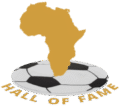OUR VERY OWN MESSI/RONALDO RIVALRY
…..ONLY THAT THEY PLAY IN THE SAME CLUB
As soon as the semi-finals were played in the just concluded Africa Cup of Nations, it was as if the scriptwriters were in for a bumper. Everything played into the hands of writers, content creators, scriptwriters. The background: there was a manager of a very famous football club in England – a global brand with […]
OUR VERY OWN MESSI/RONALDO RIVALRY
…..ONLY THAT THEY PLAY IN THE SAME CLUB Read More »





